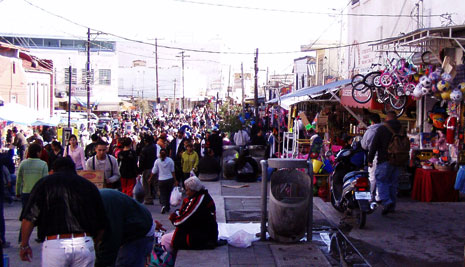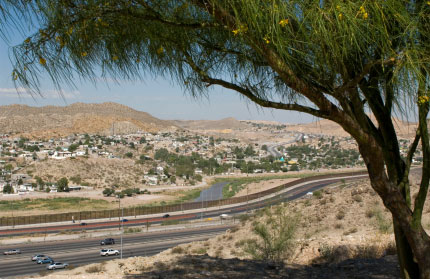EL PASO — Juarez: a place of abundant people, a city that shares its border with El Paso, a mother of a diverse culture and tradition, and yet, a site of desperation and rampant poverty.
Poverty is one of Juarez’s greatest problems, a reality that sweeps across the town like a sandstorm, seizing on its way the tender smiles and the vivid aspirations from many thousands of people.
Poverty is in the fainting child who dreams of a mouthful of beans or in the search for warmth and shelter during cold winter nights. Poverty is like the subtle wind that blows outside your window; silent, constant. It is the indivisible shadow that penetrates life.
The face of poverty in Juarez is reflected on the cluster of old buses progressing down the streets, their ragged paint hardly covering the letters of the diverse stations that disposed them.
They pass the shattered sidewalks, transporting people to their respective destinations. The buses stop by the central cathedral, revealing the faces of exhausted men and women who wake up at four in the morning to work at the maquiladoras. Most of these people do not eat breakfast; they wake up to kiss their children on the forehead, dress up in a set of old, worn-out clothes, and leave to work.

A street market in Ciudad Juarez (Circe Niezen/Borderzine.com)
Small, cardboard houses stand behind as they leave with a feeling of uncertainty as to whether they will still be there when they return. The growling of their stomachs can be heard and the bones of their thin, skeletal bodies can be felt in a mother’s warm embrace. The drained and fatigued looks of the women reflect the desire to stay home and rest. Their sense of obligation, however, is stronger. Their work can mean an extra loaf of bread. Thus, women’s profound, overpowering sigh expresses nothing other than resignation.
Small, barefoot children are seen on the streets; some begging and others selling plastic-wrapped chicles on busy avenues. Their innocent faces, dirtied by the lack of hygiene, satisfy themselves with a peso. At any given moment, there must be thousands of children doing the same thing throughout the city, waiting for someone to give them a sign of hope, eager to run home and show their mothers that they too, can do something for their families. Their tiny hands stretch out to car windows in an everlasting faith that demands a slight drop of compassion. Although this may seem unjust, a cruelty imposed by man, it is real.
I remember when I went to Juarez to work on a service project with my church group. Anapra, the poorest section of the town, was our destination. I had seen Anapra from the border while we were driving on the freeway to the west side of El Paso. Somewhere in my mind, I had registered the idea that it was a poor area. What I saw the minute that I got out of the car however, left me without breath and without expression.
Crowds of people of all ages gathered in front of us. Babies wearing nothing but their diapers crawled into their mothers’ arms crying. Men were brought out by their wives in a desperate urge to make them see. Girls with torn tennis shoes and extremely long, uncombed hair carried buckets of water to take home. It was as if they had never seen a group of people arrive there in cars before.
One by one, we started to step out with the bags of clothes we had brought with us to distribute. It was at that moment that the people realized we were there for them. Children walked close to us and began touching us as if we were some type of surreal dream; a faint image resulting as product of their imagination. The wonder and amazement reflected in their eyes portrayed their eagerness to find what was placed inside the bags.
A part of me stood cold in astonishment as I looked about at what surrounded us. Unpaved roads in which the dirt and sand were lifted by the tender breeze enclosed us. No electric posts stood at any distance, which confirmed the fact that these people did not have electricity. The buckets that were being carried by some of them were filled with water brought from the river as they did not possess running water.
Just immediately, the leader of our group asked the people to form lines so we could distribute the clothes we had collected and brought for them. As the people heard this, they began to push each other violently and with desperation so they could be the first in line. Although we tried to establish certain order, it was useless. They were so desperate to be able to receive something that they were trying to rip the bags and take the things out.
A while later, we were finally able to convince them to form different lines. I was in charge of distributing the clothes for girls ages six through twelve. It is impossible to describe with enough words the facial expression that they had when I stretched out my hand to offer them a tee-shirt or a skirt. You would think they had never received anything of this type in years, which was probably true. Women kissed some of our hands in gratitude and profound joy. Tears rolled down their cheeks out of happiness.
“Que Dios se los pague.”
“May God bless you,” they would say. Their hands revealing the marks of the long, hot days in which they had to stand outside to wash clothes and to work to feed their children. Men’s backs were tired from the passage of years in which hunger, desperation, and misery had degraded their spirits and wearied their appearances. Poverty had consumed them.

A fictitiously quiet view of Juarez from El Paso (stock photo)
At any point you may wonder how this can be. Juarez borders the United States. El Paso is a city where people live comfortably and where the preoccupation about not having enough money to eat or to shelter does not exist. These two cities combined have a population of about 2.5 million people and create one of the largest frontiers as stated by the article Juarez: A City on the Edge.
To the south, you have a deteriorated city. To the north, you find a city that belongs to the richest country in the world. However, it is possible and it is real. Juarez is a place with few rules, extreme poverty, and corruption. It depends greatly on the United States for industry and the expansion of jobs.
Large numbers of American factories have been driven to Juarez for cheaper labor. According to an article published by The Detroit News in 2004(1), the pay that workers receive is not enough to alleviate the poverty found in this city. Workers in Juarez receive only a tenth of what they would earn across the river in El Paso, while still paying American prices for consumer goods.
Furthermore, the city’s large population is another factor that explains its high poverty rate. Thousands of individuals have moved to Juarez during the past years in search of employment or in hope of crossing to the United States through the Rio Grande. The Detroit News asserts that farmers with worthless land from the poorest states of Mexico (Oaxaca, Veracruz, and Durango) moved into Juarez in search of labor, while thousands factories and powerful sources of employment have closed.
Standing from the bridge dividing the two cities, you can see that life is different. There are areas in Juarez where there is no electricity, no running water, and no gas. The problems that shadow this city’s identity are the product of a series of economic restrictions the government has placed on its people. These factors have brought about a life of poverty.
I had always known that Juarez was not an affluent community. During my years of community service, however, I had the opportunity to observe the magnitude of the situation. There were times in which we were asked to go to orphanages in Juarez to visit the children and spend time with them. Out of all the times that I went, I cannot remember one day in which the nurses did not have to struggle because there was not enough milk or bread to feed the children.
Furthermore, the children did not have school supplies and often had trouble doing their homework. The child who found a pencil or an eraser had to hide it from the others so they would not steal it. It is a situation that can only be expressed after having lived it. The eagerness that reflects upon the children’s eyes when they see you, almost begging you to take them out of misery, is heart breaking.
The nurses in charge of the orphanages do not receive support from the government and do not have enough money to sustain so many children. At the same time, however, they cannot reject them and leave them on the street. At this point, you realize how they suffer. While there are individuals in other places eating and sleeping comfortably, there are people in Juarez walking barefoot and struggling each day to get a loaf of bread for their families and a roof to spend the night.
For the fortune or for the adversity of many, the bridge of poverty that separates classes, people, and social groups continues to exist. Juarez is a city where this issue is prevalent among its members and where although people may have different occupations, many of them confront the common challenge.
Nevertheless, every day, as soon as the sun rises, the people of Juarez stand up and continue to walk along an everlasting path, a path of poverty that connects one step to the next, in hope of nothing more than a better future.
_____
(1) French, Ron. “Jobs Don’t Pay Enough to Loosen Poverty’s Grip.” The Detroit News. Nov. 21, 2004.

You really have something here. This has me thinking about some possibilities. Thanks
Poverty is considered now as an ordinary status of some places. But this does not make people stop living. They still believe that there’s always a new beginning to does who do not lose hope just like here in Juarez.
This is a very intriguing and moving article.
This is a story that saddens me. I read a book called the crossing and I think you should read this book.It is a good book….. comment from: Laurie in California,Contra Costa County